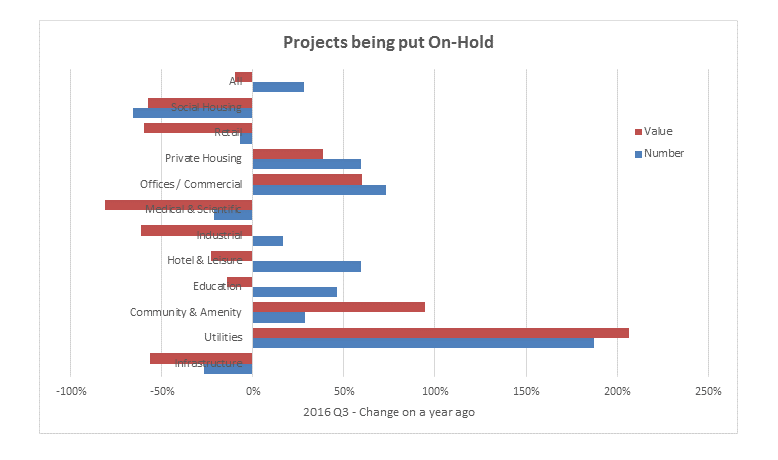Britain’s construction industry faces “inexorable decline” unless radical steps are taken to address its longstanding problems, according to an independent review commissioned by two Government departments.
The Farmer Review of the UK Construction Labour Model highlights construction’s dysfunctional training model, its lack of innovation and collaboration as well as it’s non-existent research and development (R&D) culture. Low productivity continues to hamper the sector, while recent high levels of cost inflation, driven by a shortage of workers, has stalled numerous housing schemes as they have become too expensive to build.
Led by Mark Farmer, chief executive of Cast, a real estate and construction consultancy, the hard-hitting report says we need to better align the needs of construction firms and the businesses who hire them.
“If you buy a new car, you expect it to have been built in a factory to exacting standards, to be delivered on time, to an agreed price and to a predetermined quality” said Farmer. “This needs to happen more in construction, so that the investors, developers or building owners hiring construction firms increasingly dictate the use of modern methods of delivery and invest appropriately in the skills agenda to grow this part of the industry. There are more similarities between manufacturing and construction than many people are led to believe and this perception needs to change, starting in the housing market.”
One recommendation set out for the medium term is a “carrier bag charge” style behavioural deterrent scheme. This would levy a tax on businesses who buy construction work in a way that doesn’t support industry innovation or skills development. Clients could face paying a suggested levy equal to 0.5 percent of a scheme’s construction cost but would have the ability to avoid paying this tax completely by commissioning construction in a more responsible way.
Farmer, a 25-year veteran of the industry, and former partner at EC Harris, said the industry needs to be far more joined-up with its clients in how it approaches R&D and skills. He also wants ministers to directly intervene in certain areas to ensure many of the issues identified are rectified.
Commissioned by the Department for Communities and Local Government and Department for Business, Energy and Industrial Strategy, Farmer has made 10 recommendations which include:
- Using the residential development sector as a pilot programme to drive forward the large scale use of pre-manufactured construction, for example, through off-site built or modular housing.
- A wholesale reform of the current Construction Industry Training Board (CITB) and its related levy system, including a new mandate to properly fund and drive forward both appropriate skills development and innovation to suit a modern progressive industry.
- Government to use its education, fiscal, housing and planning policy measures to initiate change and create the right conditions that will support the construction sector’s modernisation.
With more people leaving the industry each year than joining, the construction workforce is shrinking, placing increasingly severe constraints on its capacity to build housing and infrastructure. Reliance on a fractured supply chain and self-employment also means there is little incentive for contractors to invest in long term training for the labour force.
The situation is exacerbated by the fact that many school leavers and graduates don’t view construction as an attractive career choice. A YouGov poll earlier this year found that two-thirds of Britons wouldn’t consider a career in construction. If Brexit results in reduced migrant labour, the situation could be made even worse.
Crucially, it hasn’t raised its productivity in decades so urgently needs to explore ways to make the work less labour intensive, such as through offsite construction. This, in turn, could make a career in the sector more attractive for young people by moving the work from building sites to digitally enabled working in factories.
Industry Minister Jesse Norman commented “This Government is determined to support more housebuilding, more quickly and in the places people want to live. Given the launch of the £3 billion Home Building Fund, Mark Farmer’s important review in this vital sector is very timely. It makes a strong case for change in the industry, identifies areas where it needs to improve, and sets out areas for action. We will now carefully consider his recommendations.”
Paul Stanworth, Managing Director of Legal & General Capital added “This review sets out a clear way for the construction sector to reinvent itself in order to meet the ever-growing demand for homes and infrastructure. With such a chronic shortage of homes in the UK, we see rapid evolution as a “must have” for the industry, not just a “nice to have”. Having identified such a requirement, Legal & General is helping to address this problem by investing in a modern factory to produce homes using manufacturing processes seen in the production of cars and other consumer goods. This construction method is safe, clean, and fast, providing a high level of consistency and durability. We sincerely hope that Farmer’s review galvanises the entire sector to invest in innovation and secure its future.”
Download the full report here.



